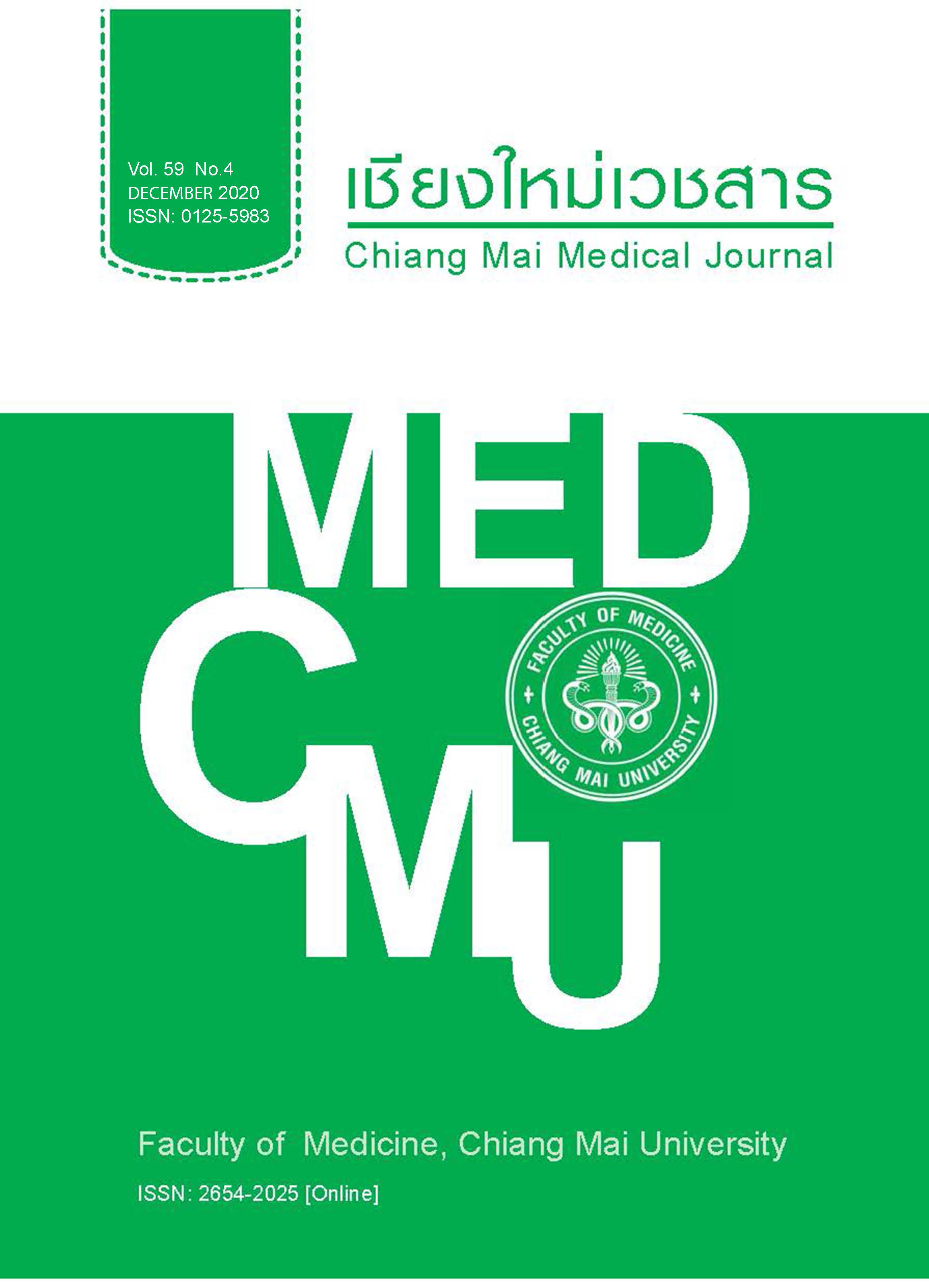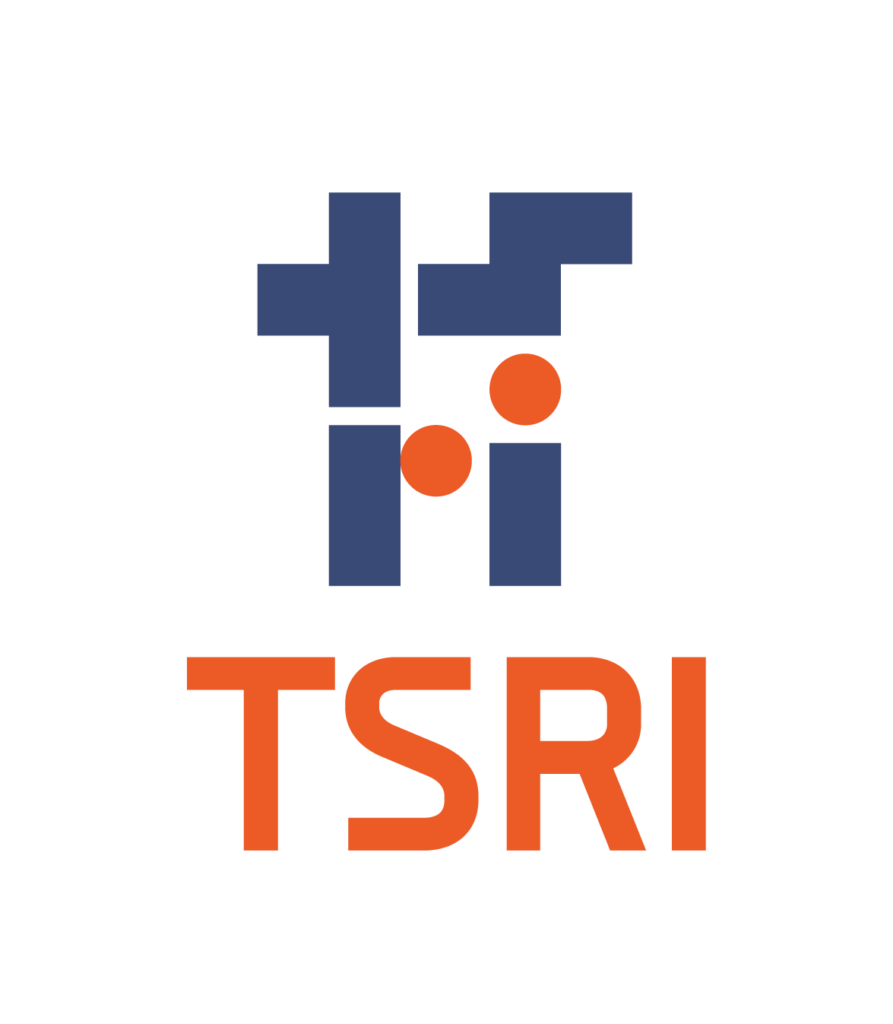Carbohydrate consumption among uncontrolled type 2 diabetes mellitus patients in Diabetic Clinic, Maharaj Nakorn Chiang Mai Hospital
การบริโภคคาร์โบไฮเดรตในผู้ป่วยเบาหวานชนิดที่ 2 ที่ควบคุมระดับน้ำตาลไม่ได้
Keywords:
Keywords: carbohydrate, consumption, Patients with type 2 diabetesAbstract
Objectives To study carbohydrate intake in uncontrolled type 2 diabetes mellitus. This study is a descriptive cross-sectional study.
Methods The samples were type 2 diabetic patients 150 people in Maharaj Nakorn Chiang Mai Hospital who were uncontrolled glucose levels with more than 7 percent hemoglobin A1 (HbA1c) from May to December 2019. The research instrument consisted of (1) The consumption interview form 24 hours dietary recalled record for three days, (2) Interview form for food consumption, which was developed by the Bureau of Nutrition, Department of Health. After collecting the data through the interview method, the researchers analyzed the nutritional data received using the NutriFacts program developed by the Nutrition Research Unit (NRU), Research Institute for Health Sciences, Chiang Mai University, Chiang Mai, Thailand. Data were presented by using descriptive statistics in a cross section (descriptive cross-sectional study).
Results This study showed uncontrolled type 2 diabetes patients, consumed the average 3 - day carbohydrate equals to 252.02±52.58 grams, inclicating excessive carbohydrates intake when comparing to the recommended amount of carbohydrates that the patient should be received per days, and the amount of carbohydrates that should calculated from the total energy expenditure each day (TEE: total energy expenditure) in the proportion of food CHO : fat : protein = 50 : 30 : 20 when considering the frequency data of various daily consumption found. Daily consumption of carbohydrates, 64.4 percent eat white rice every day, 30.7 percent eat sticky rice every day. Snacks/sweets, found more than half of the samples did not consume at all, only 5.3 -6.7 percent consumed daily. For beverages, the sample group drank plain sweet coffee, iced tea, and little sweet coffee, iced tea every day 12.0, and 10.7% , respectively. For foods of dairy products, the sample group most consumed whole milk daily 24.7 percent. For foods that are sweet and citrus fruits found that daily consumption 10.0 and 5.3% respectively, most were consumed 2-4 times/week (67.3 and 48.0 percent respectively) as well as vegetables, sample group, eating fresh vegetables, and boiled vegetables every day, 18.7 and 19.3 percent respectively.
Conclusion Patients with uncontrolled type 2 diabetes daily consumed excess carbohydrates. The results of the study can be used to plan nutritional education and consumption adjustment to improve the quality of care for diabetic patients in Maharaj Nakorn Chiang Mai Hospital.
References
International Diabetes Federation. IDF diabetes atlas eighth edition 2017 [Internet] 2017. [cited 2019 June 27]. Available from: http://www.diabetesatlas.org/IDF_Diabetes_Atlas_8e_ interactive_EN/
Office of Policy and Strategy. Ministry of Public Health. Public Health Statistics 2015. Bangkok: Sam Charoen Panit; 2016. [In Thai]
Medical Record and Statistics Section Maharaj Nakorn Chiang Mai Hospital. Statistical Report of Type 2 Diabetes Patients Diabetes Clinic and Statistics of type 2 diabetes Maharaj Nakorn Chiang Mai Hospital 2019: Faculty of Medicine Chiang Mai University; 2020. [In Thai]
Daibetetes Association of Thailand under the Royal Patronage of Her Royal Highness Princess Maha Chakri Sirindhorn Princess Mother. Clinical practice guidelines for diabetes 2017. Pathum Thani: Romyen Media. 2017:21-41. [In Thai]
American Diabetices Association [ADA]. Life Management-2017. Diabetes Care [Internet] 2017 [cited 2020 May 31] 40(Suppl.1):pS33-S43. Available from: https://care.diabetesjournals.org/content/diacare/suppl/2016/12/15/40.Supplement_1.DC1/DC_40_S1_final.pdf
Westman E C, Vernon M C. Has carbohydrate-restriction been forgotten as treatment for diabetes mellitus? A perspective on the ACCORD study design Nutition & Metabolism [Internet] 2008;5(10). [cited 2019 April]. Available from: https://www.ncbi.nlm.nih.gov/pmc/articles/PMC2315645/
Feinman RD, Pogozelski WK, Astrup A, Bernstein RK, Fine EJ, Westman EC, et al. Dietary carbohydrate restriction as the first approach in diabetes management: Critical review and evidence base Nutition [Internet] 2015;31:1-13. [cited 2019 April 1]. Available from: https://pubmed.ncbi.nlm.nih.gov/25287761/.
Thammavongsa V, Muktabhant B. Dietary intake and nutritional status of type 2 daiabetice patients at Mahosot Hospital, Vientiane Capital City, Lao PDR. Srinagarind Med J. 2013;28:30-8. [In Thai]
Kasikun R, Muktabhant B. Assessment of Carbohydrate Counting Counselling in the Type 2 Diabetic Patients. Srinagarind Med J. 2013;28:442-50. [In Thai]
Thongoi C. Food consumption behavior and nutritional status of type 2 diabetic patients in KohSamui Hospital, SuratThani Province. Mahasarakham Hospital J. 2013;14:11-22. [In Thai]
Wolever R Q, Dreusicke M, Fikkan J, Hawkins T V, Yeung S, Wakefield J, et al. Integrative health coaching for patients with type 2 diabetices: A randommizeed clinical trial. The Diabedtes Educator [Internet] 2013 [update13 July 2016] 36(4):629-39. [cited 2019 April 1]. Available from :https://www.coachingdesalud.com/files_download/Health_Coaching_Diabetes_tipo_2-2010.pdf
Young D, Furler J, Vale M, Walker C, Segal L, Dundar J, et al. Patient engagement and coaching for ealth: TH PEACH study a cluster randomisied controlled trail using the telephone to coach people with type 2 diabetes to engage with their GPs to improve diabetic care: A stydy protocol. BMC Family Practice [Internet] 2007;8:1-9. [cited 2020 June2]. Available from:https://pubmed.ncbi.nlm.nih.gov/17428318/
Pornprayut C, Toonsiri C, Rattanagreethakul C. Effective of Coaching Program on Diabetes Behavioral Control and HbA1C among Persons with Type 2 Diabetes Mellitus. The Journal of Faculty of Nursing Burapha University. 2017;25:61-9. [In Thai]
Ekakun T. Research Methodology in Behavioral Science and Social Sciences Ubon Ratchathani: Ubon Ratchathani Rajabhat Institute; 2000. [In Thai]
Chaowalitkun N. Evaluation of nutritional status and food consumption behavior. Presentation documents in the annual academic conference 2015 Bureau of Nutrition Department of Health, Nonthaburi [Internet] 2015. [cited 2019 April 1]. Availble from:http:// thaincd.com/2016/mission/activity.php?tid=31,29&gid=1015&searchText=&pn=10
Ongiem A, Vichitvejpaisai P. Validation of Tests. Thai J Anesthasiol. 2018,44:36-42. [In Thai]
Pong–Im T. Calculation formula for nutritional conditions Success formula, Nopparat diet Benderlized diet & Oral supplement Academic Presentation 2012 Nopparat Conference 16th Crisis or opportunity to advance to the ASEAN Economic Community (AEC) Nutrition Division Nopparatrajathanee Hopital [Internet] 2012. [cited 2020 Jan 2]. Available from:http://www.nopparat.go.th/nc/main/datafile.php.
Anderson J W, Randles K M, Kendell WC C, Jenkins JA D. Carbohydrate and Fiber Recommendations for Individuals With Diabetes: A Quantitative Assessment and Meta-Analysis of the Evidence. Journal of the American College of Nation [Internet] 2004;23:5-17. [cited 2020 Jan 3]. Available from:https://pubmed.ncbi.nlm.nih.gov/14963049/
Tay J, Marsh L D N, Thomsonpson H C, Noakes M, Jonathan D B, Wittert A G, et al. Comparison of Low- And High-Carbohydrate Diets for Type 2 Diabetes Management: A Randomized Trial The American Journal of Clinical Nutrition [Internet] 2015;102:780–90. [cited 2020 July 2]. Available from: https://academic.oup.com/ajcn/article/102/4/780/4564662
Downloads
Published
How to Cite
Issue
Section
License

This work is licensed under a Creative Commons Attribution-NonCommercial-NoDerivatives 4.0 International License.










